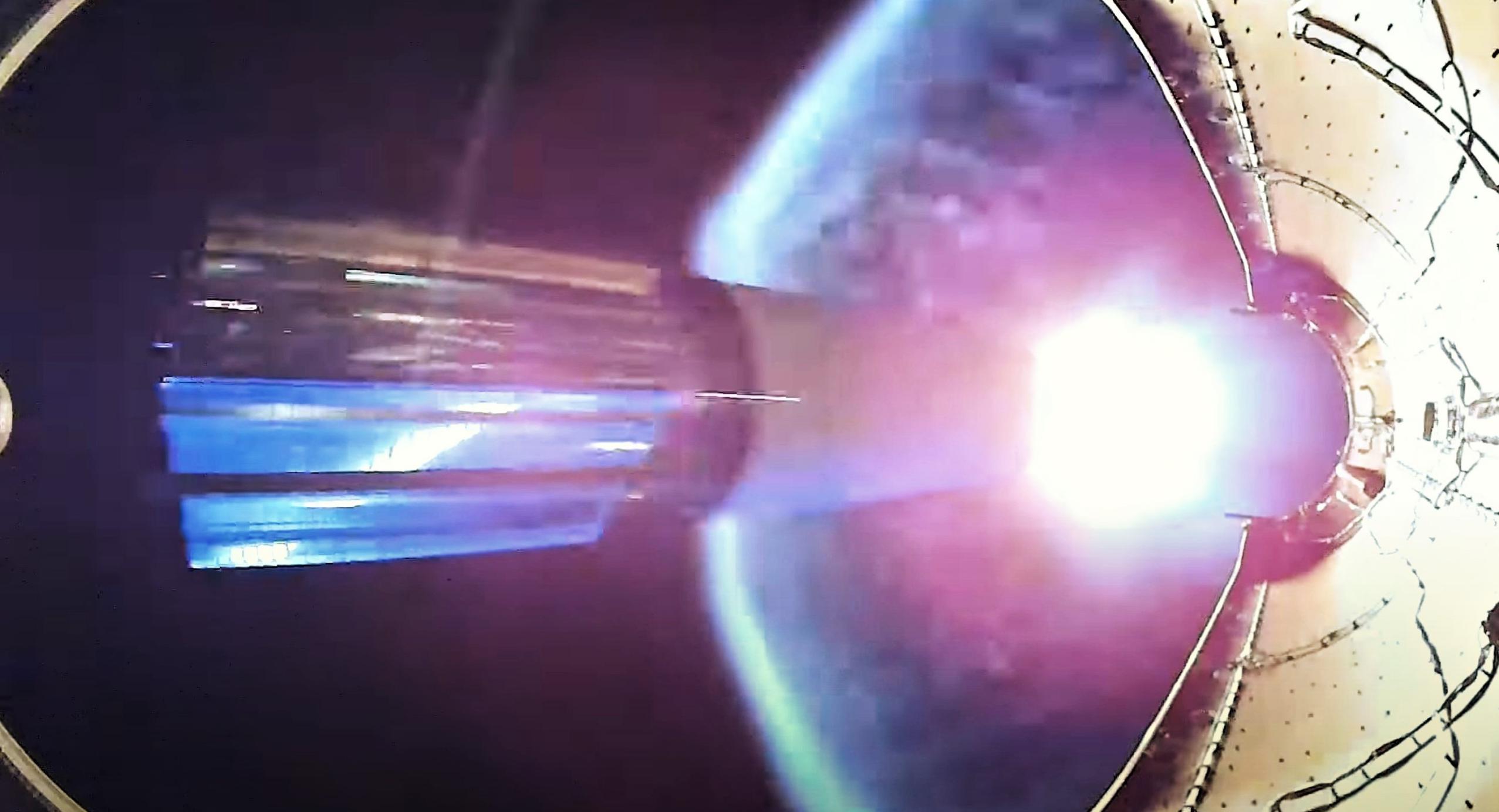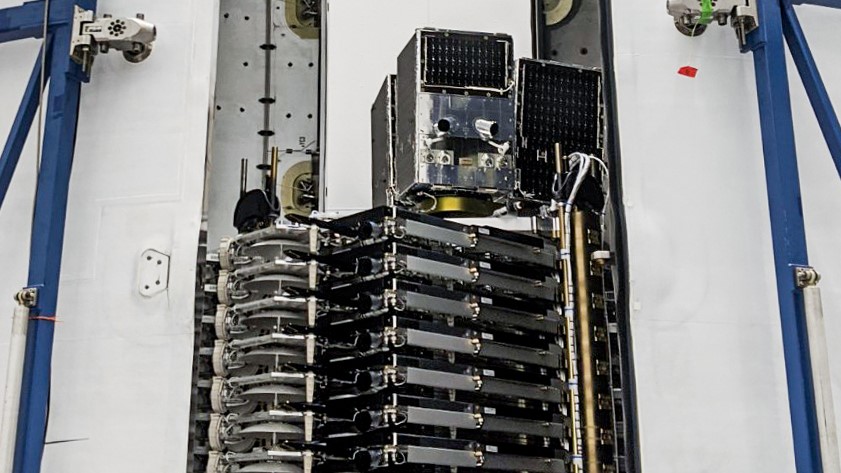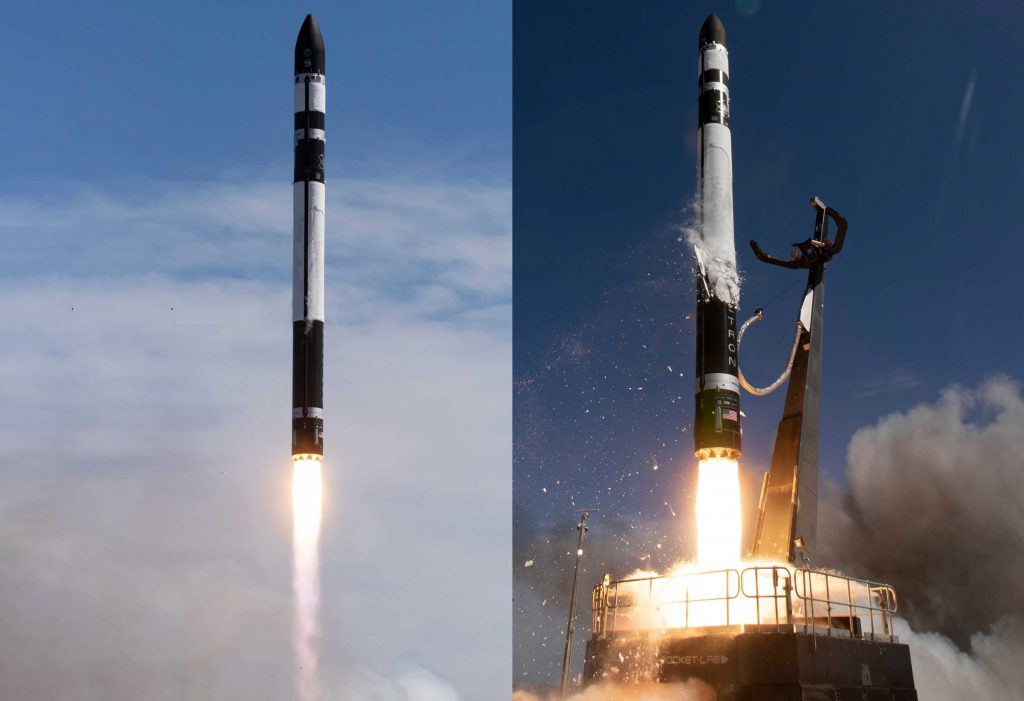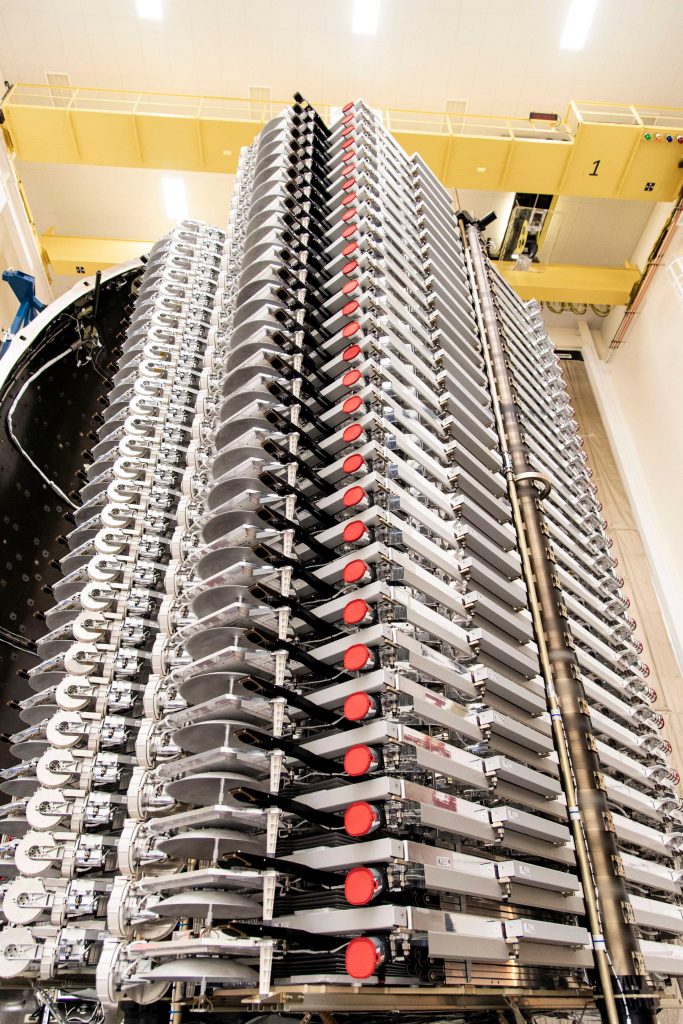

News
Here’s what SpaceX’s first Starlink satellite rideshare mission looks like [photo]
By way of customer Planet, SpaceX has published the first view of its inaugural Starlink satellite rideshare mission, revealing three mini fridge-sized Earth imaging satellites perched on a stack of dozens of Starlink spacecraft.
Scheduled to launch no earlier than (NET) 5:21 am (09:21 UTC) on June 13th, SpaceX’s eighth launch of Starlink v1.0 satellites (Starlink V1 L8) could usher in a revolutionary new way for smallsat operators to get their spacecraft in orbit. The company’s first Starlink rideshare customer has become a vocal supporter in the days before the first launch, praising unprecedentedly low launch costs SpaceX is able to offer. In fact, executives of Planet – now the world’s second most prolific satellite launcher after SpaceX – were so surprised at the prices the launch company was charging that they “could not believe what [they] were looking at”.
To account for the mass added by three Planet SkySats (~350 kg or 770 lb), SpaceX revealed earlier today that it had removed two Starlink satellites – each weighing ~260 kg (570 lb) – from the original stack of 60 spacecraft. Aside from confirming that Falcon 9 is balancing at the very edge of its performance envelope to launch ~16 metric tons (~35,000 lb) of satellites while still enabling booster recovery, the removal of two Starlink satellites to make way for rideshare payloads hints at an incredible level of flexibility available to SpaceX.

For customers of the fledgling small satellite rideshare program interested in procuring launch services directly, Planet’s SkySats are almost perfectly sized to extract the most bang for the buck from SpaceX’s current pricing system. Planet likely spent a bit more to have SpaceX build it a custom adapter and deployment mechanism for two launches, but the company’s launch costs for six SkySats – split between two June 2020 Starlink missions – could be as low as $6 million based on SpaceX’s own calculator. Due to the general secrecy of launch prices, it’s hard to accurately compare, but Planet would have had to pay upwards of $40 million – almost seven times as much – to launch six SkySats on dedicated Rocket Lab Electron rockets.

In return for $5-30+ million dollars in savings, Planet’s six new SkySats will have to work to raise their orbits from around 300 to 450 kilometers (190-280 mi) after deploying from SpaceX’s Starlink satellite stack. That work will expend a significant portion of their propellant reserves, likely cutting several months (up to several years) off of their operational lifespans. Believed to cost around $3-5 million each, however, the money Planet has saved by launching SkySats with SpaceX could potentially pay for an entirely new batch of six more satellites (or more).
With cost savings like that at hand, it’s no wonder that Planet’s Mike Safyan – Vice President of Launch – described SpaceX’s Starlink rideshare program as “incredibly competitive” and “one of the more significant programs for the smallsat industry”. Having overseen the launch of hundreds of Planet’s Dove and SkySat satellites over the last nine years, it would be hard to find a more qualified industry voice on the subject. Indeed, the rest of the smallsat industry is also responding positively to SpaceX’s new offering, with dozens of commercial spacecraft already assigned to future rideshare launches.

At this point, SpaceX plans to offer rideshare opportunities on Starlink missions every month for the indefinite future, all while charging as little as a $1 million per slot. Thanks to third-party launch services companies like Spaceflight and Exolaunch, much smaller cubesats and nanosats will also have ways to get into orbit on SpaceX rockets for much less than the company’s base price. Meanwhile, scheduled to launch no earlier than June 22nd, SpaceX’s very next Starlink launch – V1 L9 – is expected to include three more Planet SkySats and two similar BlackSky imaging satellites.
If SpaceX can maintain the impressive inertia of its Starlink launch and rideshare efforts, it’s safe to say that the company is going to be a towering presence in the smallsat launch industry for the foreseeable future.
Check out Teslarati’s Marketplace! We offer Tesla accessories, including for the Tesla Cybertruck and Tesla Model 3.
News
Tesla cleared in Canada EV rebate investigation
Tesla has been cleared in an investigation into the company’s staggering number of EV rebate claims in Canada in January.

Canadian officials have cleared Tesla following an investigation into a large number of claims submitted to the country’s electric vehicle (EV) rebates earlier this year.
Transport Canada has ruled that there was no evidence of fraud after Tesla submitted 8,653 EV rebate claims for the country’s Incentives for Zero-Emission Vehicles (iZEV) program, as detailed in a report on Friday from The Globe and Mail. Despite the huge number of claims, Canadian authorities have found that the figure represented vehicles that had been delivered prior to the submission deadline for the program.
According to Transport Minister Chrystia Freeland, the claims “were determined to legitimately represent cars sold before January 12,” which was the final day for OEMs to submit these claims before the government suspended the program.
Upon initial reporting of the Tesla claims submitted in January, it was estimated that they were valued at around $43 million. In March, Freeland and Transport Canada opened the investigation into Tesla, noting that they would be freezing the rebate payments until the claims were found to be valid.
READ MORE ON ELECTRIC VEHICLES: EVs getting cleaner more quickly than expected in Europe: study
Huw Williams, Canadian Automobile Dealers Association Public Affairs Director, accepted the results of the investigation, while also questioning how Tesla knew to submit the claims that weekend, just before the program ran out.
“I think there’s a larger question as to how Tesla knew to run those through on that weekend,” Williams said. “It doesn’t appear to me that we have an investigation into any communication between Transport Canada and Tesla, between officials who may have shared information inappropriately.”
Tesla sales have been down in Canada for the first half of this year, amidst turmoil between the country and the Trump administration’s tariffs. Although Elon Musk has since stepped back from his role with the administration, a number of companies and officials in Canada were calling for a boycott of Tesla’s vehicles earlier this year, due in part to his association with Trump.
News
Tesla Semis to get 18 new Megachargers at this PepsiCo plant
PepsiCo is set to add more Tesla Semi Megachargers, this time at a facility in North Carolina.

Tesla partner PepsiCo is set to build new Semi charging stations at one of its manufacturing sites, as revealed in new permitting plans shared this week.
On Friday, Tesla charging station scout MarcoRP shared plans on X for 18 Semi Megacharging stalls at PepsiCo’s facility in Charlotte, North Carolina, coming as the latest update plans for the company’s increasingly electrified fleet. The stalls are set to be built side by side, along with three Tesla Megapack grid-scale battery systems.
The plans also note the faster charging speeds for the chargers, which can charge the Class 8 Semi at speeds of up to 1MW. Tesla says that the speed can charge the Semi back to roughly 70 percent in around 30 minutes.
You can see the site plans for the PepsiCo North Carolina Megacharger below.

Credit: PepsiCo (via MarcoRPi1 on X)

Credit: PepsiCo (via MarcoRPi1 on X)
READ MORE ON THE TESLA SEMI: Tesla to build Semi Megacharger station in Southern California
PepsiCo’s Tesla Semi fleet, other Megachargers, and initial tests and deliveries
PepsiCo was the first external customer to take delivery of Tesla’s Semis back in 2023, starting with just an initial order of 15. Since then, the company has continued to expand the fleet, recently taking delivery of an additional 50 units in California. The PepsiCo fleet was up to around 86 units as of last year, according to statements from Semi Senior Manager Dan Priestley.
Additionally, the company has similar Megachargers at its facilities in Modesto, Sacramento, and Fresno, California, and Tesla also submitted plans for approval to build 12 new Megacharging stalls in Los Angeles County.
Over the past couple of years, Tesla has also been delivering the electric Class 8 units to a number of other companies for pilot programs, and Priestley shared some results from PepsiCo’s initial Semi tests last year. Notably, the executive spoke with a handful of PepsiCo workers who said they really liked the Semi and wouldn’t plan on going back to diesel trucks.
The company is also nearing completion of a higher-volume Semi plant at its Gigafactory in Nevada, which is expected to eventually have an annual production capacity of 50,000 Semi units.
Tesla executive teases plan to further electrify supply chain
News
Tesla sales soar in Norway with new Model Y leading the charge
Tesla recorded a 54% year-over-year jump in new vehicle registrations in June.

Tesla is seeing strong momentum in Norway, with sales of the new Model Y helping the company maintain dominance in one of the world’s most electric vehicle-friendly markets.
Model Y upgrades and consumer preferences
According to the Norwegian Road Federation (OFV), Tesla recorded a 54% year-over-year jump in new vehicle registrations in June. The Model Y led the charge, posting a 115% increase compared to the same period last year. Tesla Norway’s growth was even more notable in May, with sales surging a whopping 213%, as noted in a CNBC report.
Christina Bu, secretary general of the Norwegian EV Association (NEVA), stated that Tesla’s strong market performance was partly due to the updated Model Y, which is really just a good car, period.
“I think it just has to do with the fact that they deliver a car which has quite a lot of value for money and is what Norwegians need. What Norwegians need, a large luggage space, all wheel drive, and a tow hitch, high ground clearance as well. In addition, quite good digital solutions which people have gotten used to, and also a charging network,” she said.
Tesla in Europe
Tesla’s success in Norway is supported by long-standing government incentives for EV adoption, including exemptions from VAT, road toll discounts, and access to bus lanes. Public and home charging infrastructure is also widely available, making the EV ownership experience in the country very convenient.
Tesla’s performance in Europe is still a mixed bag, with markets like Germany and France still seeing declines in recent months. In areas such as Norway, Spain, and Portugal, however, Tesla’s new car registrations are rising. Spain’s sales rose 61% and Portugal’s sales rose 7% last month. This suggests that regional demand may be stabilizing or rebounding in pockets of Europe.
-

 Elon Musk2 weeks ago
Elon Musk2 weeks agoTesla investors will be shocked by Jim Cramer’s latest assessment
-

 Elon Musk2 days ago
Elon Musk2 days agoxAI launches Grok 4 with new $300/month SuperGrok Heavy subscription
-

 Elon Musk4 days ago
Elon Musk4 days agoElon Musk confirms Grok 4 launch on July 9 with livestream event
-

 News1 week ago
News1 week agoTesla Model 3 ranks as the safest new car in Europe for 2025, per Euro NCAP tests
-

 Elon Musk2 weeks ago
Elon Musk2 weeks agoA Tesla just delivered itself to a customer autonomously, Elon Musk confirms
-

 Elon Musk1 week ago
Elon Musk1 week agoxAI’s Memphis data center receives air permit despite community criticism
-

 News2 weeks ago
News2 weeks agoXiaomi CEO congratulates Tesla on first FSD delivery: “We have to continue learning!”
-

 Elon Musk2 weeks ago
Elon Musk2 weeks agoTesla scrambles after Musk sidekick exit, CEO takes over sales

















